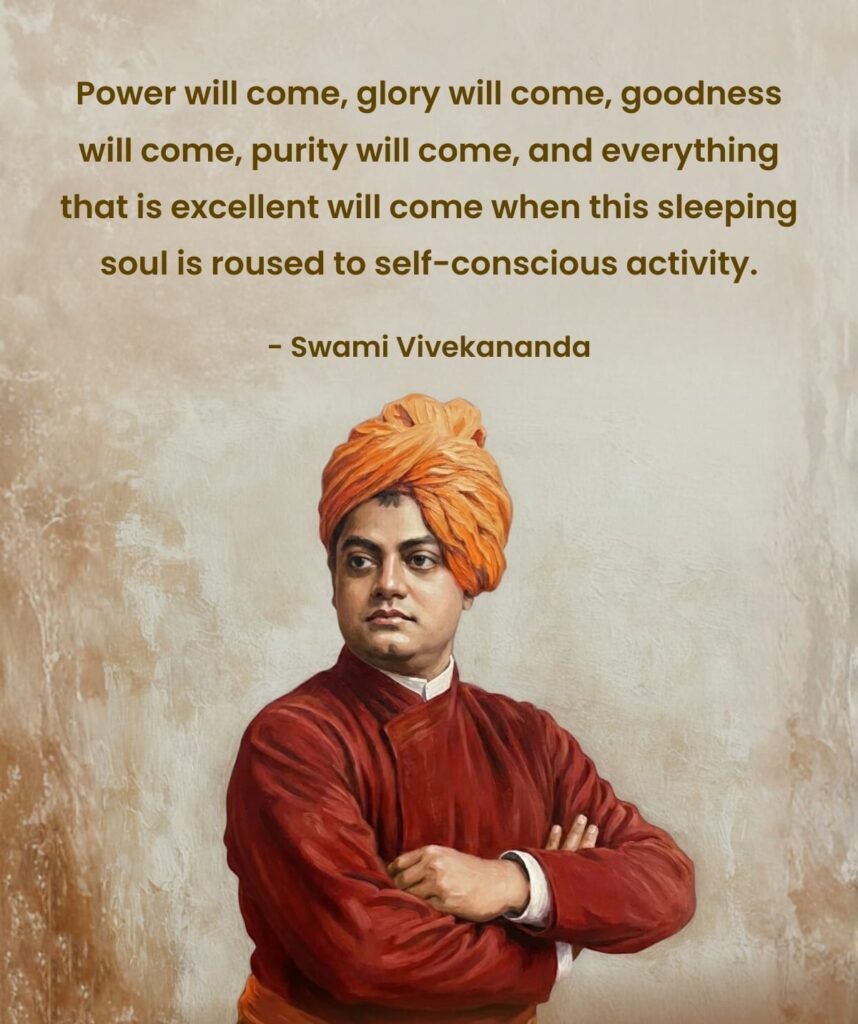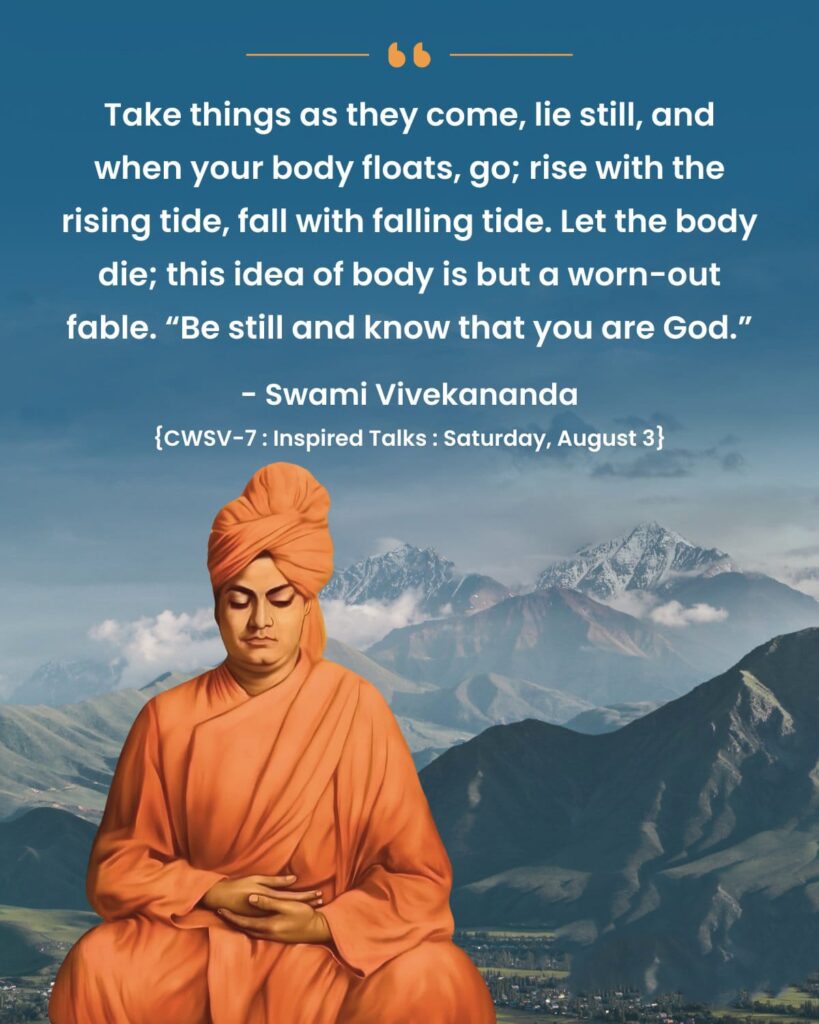तस्मात्सर्वेषु कालेषु मामनुस्मर युध्य च |
मय्यर्पितमनोबुद्धिर्मामेवैष्यस्यसंशयम् || 7||
tasmāt sarveṣhu kāleṣhu mām anusmara yudhya cha
mayyarpita-mano-buddhir mām evaiṣhyasyasanśhayam
tasmāt—therefore; sarveṣhu—in all; kāleṣhu—times; mām—Me; anusmara—remember; yudhya—fight; cha—and; mayi—to Me; arpita—surrender; manaḥ—mind; buddhiḥ—intellect; mām—to Me; eva—surely; eṣhyasi—you shall attain; asanśhayaḥ—without a doubt
Translation:
Therefore, at all times, constantly remember Me and fight. With your mind and intellect absorbed in Me, you will surely come to Me.
Commentary:
This verse seems to be a commentary on the previous one in which it is declared that the devotee who shall think of Him at the moment of death will attain Him. Here the Lord clarifies the declaration by stating that it is the duty of the devotee to think of Him at all times. It is implied that unless a man thinks of Him always, he cannot retain that blissful memory at the time of death.
It is the lamp that keeps away darkness. When the lamp is put out, darkness envelopes everything. The darkness of ignorance is ready to possess the heart of man if the lamp of knowledge is not kept burning continuously. It is only the thought of the Lord that keeps away delusion. When that thought is not there, delusion immediately seizes man. Therefore remember Me at all times – is the Lord’s command.
Anusmara: Continuous thought of the Supreme should be kept up. Hearing of the Lord, thinking of Him, meditating on Him, the seeker should not let go his hold of the Lord at any time. Such a man need not bother whether death comes sooner or later. Having purchased the ticket, it does not matter when the train comes! Let death come when it will, the seeker is ready with the Lord’s name on his lips and His thought in the mind.
If all the time the seeker is thinking of the Lord, how can he get on in the world? When does he find time to look after the practical duties of life? This question is asked by many people. Most people also make it an excuse that they are not able to think of God because of pressing domestic duties. To such people the Lord here gives the advice. “Think of Me and perform your duties.” Arjuna’s duty on the battle-field was to fight. For each man as he is placed in the various stations and circumstances of life, there will be particular duties and they should be performed while keeping the thought of the Lord in the mind.
The declaration of the Lord proves that the Gita Sastra is not the philosophy of mendicants, escapists, idlers, and cowards. It is the doctrine that unites practical life with the highest realisation. Remember me and do your duty (“Mam anusmara yudhya cha.“) – This is one of the central teachings of Gita.
The mind generates thought and intellect approves and confirms it. So one should think of the Lord both with mind and intellect. These two faculties of the mind should be fixed in or surrendered to the Lord.
Asamsayah: The Lord affirms His declaration and excludes all doubts and fears from the mind of his devotees. So it is the duty of all aspirants to have faith in the Lord’s command, do spiritual sadhana and attain Him.

What is Karma Yoga?
Once Swami Vireswarananda Maharaj had come to Ramakrishna Ashrama, Gwalior, to give mantra-diksha to the devotees. To attend on him I had accompanied Swami Atmanandaji. One day finding an opportunity I told him, “Maharaj, we, sadhus and brahmacharis work with unselfish motive. Hence, all our actions automatically become Yoga. We don’t need any other spiritual discipline. Even Swami Vivekananda has said that by performing selfless service one can attain Mukti.” Revered Maharaj very firmly replied, “No.” I pointed out, “Swamiji has said that Karma Yoga leads to Mukti.” Then Maharaj asked, “Do you know what Karma Yoga is?” After a pause, he himself answered, “Conscious and constant remembrance of God while working.” This instruction is like a light house in our life.
— Swami Satyarupananda
Sri Ramakrishna Says —
“Give up all such notions as: ‘Shall we be cured of our delirium?’, ‘What will happen to us?’, ‘We are sinners!’ (To Nanda) One must have this kind of faith: ‘What? Once I have uttered the name of Rama, can I be a sinner any more?'”
NANDA: “Is there no after-life? What about punishment for our sins?”
MASTER: “Why not enjoy your mangoes? What need have you to calculate about the after-life and what happens then, and things like that? Eat your mangoes. You need mangoes. You need devotion to God —”
NANDA: “But where is the mango-tree? Where do I get mangoes?”
MASTER: “Tree? God is the eternal and infinite Brahman. He does exist; there is no doubt about it. He is eternal. But you must remember this, that He is the Kalpataru.
Come, let us go for a walk, O mind, to Kali, the Wish-fulfilling Tree,
And there beneath It gather the four fruits of life.
“You must go to the Kalpataru and pray. Only then will you obtain the fruits. Only then will the fruits fall from the tree. Only then will you be able to gather them. There are four fruits: dharma, artha, kama, and moksha. The jnanis seek the fruit of liberation; and the bhaktas, love of God, love without any motive behind it. They seek neither dharma nor artha nor kama.
“You ask about the after-life. According to the Gita you will become in the next life what you think of in the hour of death. King Bharata was very much grieved over his pet deer; he died repeating the word ‘deer’; therefore he was reborn as a deer. That is why day and night a man should practise worship, japa, meditation, and other spiritual exercises. Only then, by virtue of practice, will he be able to think of God in the hour of death. (BG 8.5,BG 8.6,BG 8.7,BG 8.8) If one dies thus, thinking of God, one will acquire God’s nature. (Source: Gospel of Sri Ramakrishna)
—–
Sri Ramakrishna: “Live in the world but keep the pitcher steady on your head; that is to say, keep the mind firmly on God.
“I once said to the sepoys from the barracks: ‘Do your duty in the world but remember that the “pestle of death” will some time smash your hand. Be alert about it.’
“In Kamarpukur I have seen the women of carpenter families making flattened rice with a husking-machine. One woman kicks the end of the wooden beam, and another woman, while nursing her baby, turns the paddy in the mortar dug in the earth. The second woman is always alert’ lest the pestle of the machine should fall on her hand. With the other hand she fries the soaked paddy in a pan. Besides, she is talking with customers; she says: ‘You owe us so much money. Please pay it before you go.’ Likewise, do your different duties in the world, fixing your mind on God. But practice is necessary, and one should also be alert. Only in this way can one safeguard both — God and the world.“
—
Do your duties in the world as if you were the doer, but knowing all the time that God alone is the Doer and you are the instrument.
I tell you the truth: there is nothing wrong in your being in the world. But you must direct your mind toward God; otherwise you will not succeed. Do your duty with one hand and with the other hold to God. After the duty is over, you will hold to God with both hands.
It is very difficult to do one’s duty in the world. If you whirl round too fast you feel giddy and faint; but there is no such fear if you hold on to a post. Do your duty, but do not forget God.
Live in the world like a maidservant in a rich man’s house. She bathes her master’s children, washes them, feeds them, and takes affectionate care of them in many ways, as if they were her own children; but in her heart she knows very well that they do not belong to her. No sooner is she dismissed than all is over; she has no more relationship with the children.
“Before breaking open the jack-fruit you should rub your hands with oil in order to protect them from the sticky juice. Likewise, protect yourself with the oil of devotion; then the world will not cling to you and you will not be affected by it.”
Question: When should one think of God?
Answer: Always and ever.
Question: What about man’s worldly duties?
Answer: He should perform them and at the same time think of the Lord.
Question: What is the way to attain the Lord?
Answer: Surrendering the mind and intellect to Him.
Bhagavad Gita: Chapter 8 🔻 (28 Verses)


